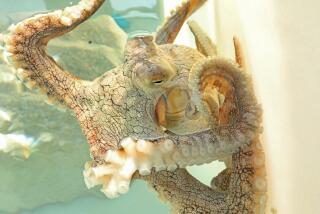Exemption for Helicopters : Panel Backs Tax Break for Large Tuna Boats
- Share via
SACRAMENTO — A bill by Assemblyman Peter Chacon (D-San Diego) that would give a special tax break to owners of the state’s largest tuna boats won narrow approval by a key committee Thursday over the strenuous objections of the panel’s powerful chairman.
Chacon’s bill, which would exempt helicopters used in fishing operations from the state’s 6% sales tax, passed the Senate Appropriations Committee with the bare-minimum five votes.
Sen. Ruben S. Ayala (D-Chino), one of those who voted for the bill, said he feels certain Gov. George Deukmejian “is going to veto it anyway.”
Appropriations Committee Chairman Daniel E. Boatwright, echoing Deukmejian’s argument when he vetoed a similar bill last year, said deep-sea fishing operations already have numerous tax breaks.
Boats, parts and diesel fuel are already exempt from sales taxes, and the vessels are assessed for property taxes at only 4% of their value, Boatwright said.
“We’ve given you all the aid we can possibly give you,” said Boatwright. “Every time . . . it is on the promise that it is going to save the industry. . . . Why should we give one more when they continue to go downhill anyway?”
Owners of the largest tuna seiners in the U.S. fleet, many of them owned by San Diegans, have been trying to win the legislation since 1984, when the state Board of Equalization ruled that a helicopter is an aircraft--not a “commercial watercraft”--and therefore not covered by the existing exemption.
Tuna boat owners had sought unsuccessfully to persuade the tax agency that helicopters are a “component part” of the large fishing vessels, which use them to spot schools of fish. In effect, said August Felando, president of the American Tunaboat Assn., a helicopter is an extension of a vessel’s crow’s nest.
Chacon’s bill declares that a helicopter used exclusively in deep-sea fishing and stationed aboard the watercraft is, indeed, a component part of vessel. While the legal semantics may sound insignificant, the impact of the interpretation is not.
On the purchase of a new $250,000 helicopter, the exemption would mean a $15,000 tax savings to a boat owner. State officials estimate that state and local governments would lose $133,000 to $330,000 in annual revenue.
But Chacon and Felando said the revenue losses are exaggerated because only 10 of the tuna boats operating from California are large enough to use helicopters.
On the average, two of the boats would be replacing helicopters each year, Chacon said. And Felando said many of the boat owners would be buying used helicopters at a fraction of the cost the Department of Finance used in its estimates.
Chacon said his bill is “much narrower” than the one Deukmejian vetoed last year. Under this year’s bill, the sales tax exemption would expire in five years and there are no provisions to give tax refunds to tuna boat owners who have already bought helicopters, he said.
Felando, who is related to Republican Assemblyman Gerald N. Felando of San Pedro, said the legislation would mainly be a symbolic gesture that would signal that California--the state “where the tuna industry began”--is sympathetic to the industry’s current woes.
He said the State of Washington has a similar exemption for helicopters and many foreign fleets pay virtually no taxes. With only one cannery still operating in the state, the gross value of tuna unloaded in California has dwindled from $227 million in 1980 to around $27 million last year.
He said favorable legislation could bring tuna boats back to the state and have “a ripple effect” on the economy.
Felando said fishermen from San Diego discovered the utility of helicopters in spotting and netting fish in the late 1940s. But he said aircraft were not advanced enough to be safely used at sea at the time, and not until the Vietnam War have pilots been readily available to the fishing industry.
With the aircraft and powerful binoculars, skippers can spot birds, which signal there are fish nearby, from farther away. It also allows the pilot to explore and scout an area, without using the time and fuel to take their boats there.
“They can spot them for 100 miles, 200 miles away from their boats,” said Sen. Wadie P. Deddeh (D-Chula Vista), who voted for Chacon’s bill in committee. “Otherwise, they could be wasting an awful lot of fuel chasing rainbows.”
More to Read
Get the L.A. Times Politics newsletter
Deeply reported insights into legislation, politics and policy from Sacramento, Washington and beyond. In your inbox twice per week.
You may occasionally receive promotional content from the Los Angeles Times.










